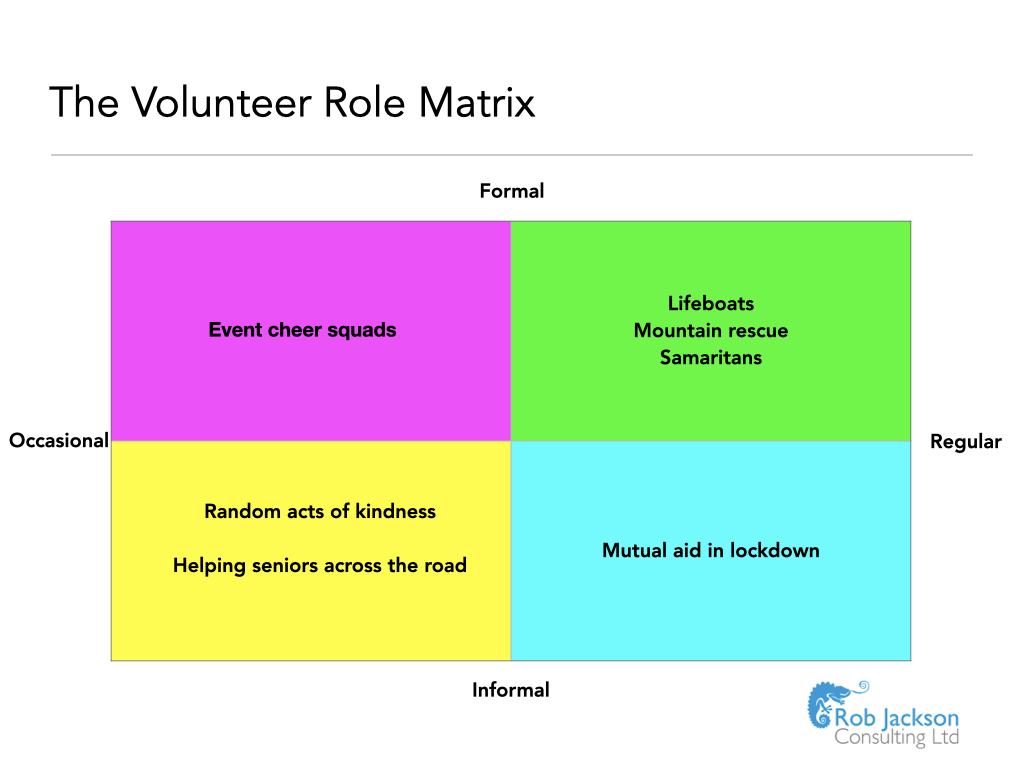For this latest post on the Rob Jackson Consulting Ltd blog, I want too welcome Sarah Thomas, Volunteer Services Manager at Dougie Mac Hospice (see full bio below).
Sarah shares her story of a new approach to volunteer recruitment and how they have been evolving the support they provide to their volunteers.
I hope you find what Sarah has to share interesting.
Like most charities, our volunteers at Dougie Mac are vital to the work we do. We consider ourselves lucky to be able to have a dedicated family of regular volunteers to help out across all areas. From making delicious cups of tea, counting money, to offering a listening ear and sorting through our charity shop donations, each role is just as needed as the next.
Quite honestly we couldn’t do what we do without them.
As an ambitious organisation, we’re always looking to grow and evolve our services and we know there are more families who could benefit from our support and care.
Quite simply, we need more volunteers to enable us to grow and reach more people in our community.

I’m sure that most volunteer managers would agree that if we could wave a magic wand to create more volunteers, we would – if only it was that easy!
In the absence of that magic wand, at the start of 2024 we kicked off a new volunteer recruitment campaign. We began by using more traditional marketing routes with paid adverts on local buses and billboards, and in several local newspapers. I also did interviews with local radio stations and we shared posts about volunteering (including quotes and case studies from some of our regular volunteers) on our own social media channels. This all worked really well, but we also wanted to be a bit braver and try something a bit different. . .
We decided to reach out to some well-known people within our local community, to ask them to give some of their own time to volunteer with us.
During a week at the end of February, we welcomed a local chef, a TV presenter, local business owners, a local artist and a social media influencer to spend some time getting involved with various activities within the hospice. They each rolled up their sleeves and got stuck in, with some of them doing tasks that were completely outside of their comfort zones.
Each ‘guest’ volunteer shared posts on their own social media channels, which we re-shared.
The results were phenomenal!
Our profile visits increased by 475% that week, while our reach increased by 336% and our account engagement increased by 25% compared to the previous month. So far the results of the campaign have been really positive and we’ve already seen a 20% increase in the number of accepted volunteers since the start of the year.
For me though, the most rewarding part has been the chance to really shine the spotlight on the amazing dedication our volunteers show — it’s also encouraged me to think about what more we could do to celebrate and recognise the contribution they make.
With that in mind, we’ve recently increased the volunteer milestone badges to celebrate length of service. It’s only a small gesture, but if someone has given their time week in, week out, we want to thank them. Our volunteers will now receive a pin badge when they reach one, three, five, ten, fifteen, twenty, twenty-five and thirty years of service (and yes we do already have some volunteers who are approaching that huge milestone!).

We already pride ourselves on having a real focus on engagement and communication with both volunteers and line managers — the better the relationship, the better the opportunity for honest and valuable feedback.
Following our annual volunteer survey, we introduced “You Said, We Did”. The survey itself is anonymous but the results are collated and the main points raised are actioned and reported on to show that we’re really listening and we really do care about feedback.
We also believe it’s essential to support our line managers who have volunteers within their teams. Updates and information are really important and we let line managers know of any changes so they’re able to answer any questions. We’ll also give support with any volunteer-related issues, whether it’s over the phone or in person, and while we might not always be able to provide the desired solution, we always make the time to listen.
Now we’ve successfully recruited more volunteers and we’re working hard to make their experience of volunteering with Dougie Mac as rewarding as possible, what’s next?
Well, looking forward our plans for the next year include more volunteer engagement activities, as well as some ‘lunch and learn’ sessions to increase confidence for line managers who are mentoring volunteers.
And, of course, our main goal is to continue to grow our fantastic family of volunteers and, in turn, help to improve and add to their personal wellbeing.
I encourage everyone to be inspired and motivated by the excellent volunteers we are so lucky to work alongside and collaborate with!
You can contact Sarah at volunteernow@dmhospice.org.uk if you’d like to know more about the work she has been doing.
Sarah Thomas is the Volunteer Services Manager at Dougie Mac, a hospice with children, young adult and adult services covering Stoke-on-Trent, North Staffordshire and the surrounding villages. Founded in 1973, Dougie Mac is one of the UK’s largest independent hospices and cares for around 3,000 people every year.
Following in the footsteps of her Dad, Sarah started working in special education, working across most age groups for nearly a decade. This work enabled Sarah to realise her passion for supporting others and working with people to develop skills and reach goals. In a career change, Sarah began working in the voluntary sector with roles in military charities and most recently as a Volunteer Co-ordinator at Dougie Mac, where she has now worked for nearly three years. Having volunteered herself in varying roles from Rainbow leader to Hospice Receptionist, Sarah had a good idea of what was needed for a great (and not so great) volunteer experience.
Working closely with colleagues in the Dougie Mac Volunteer Services team, Sarah oversees 700+ volunteers. From the start of the Dougie Mac volunteer journey, the team works hard to deliver an efficient and supportive process which helps to make the volunteers a fundamental addition to hospice services.
Find out more about Rob and Rob Jackson Consulting Ltd on the website.
Sign up here for the free Rob Jackson Consulting Ltd newsletter, published every two months.










